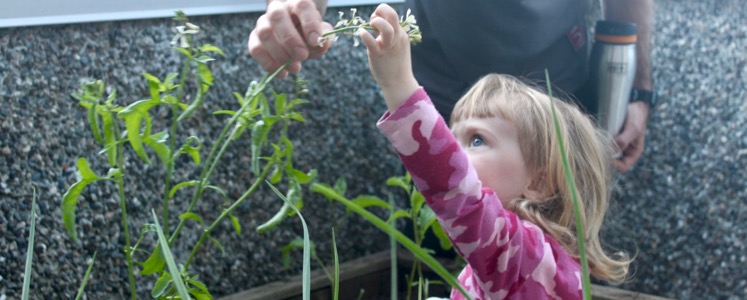Learn how planting seeds can help sprout healthy eating habits in children.
As longer days and warmer weather make it easier to get into the gardening spirit, consider inviting your children to join in and get their hands dirty.
Relaxation, exercise, vitamin D, the reward of producing your own food…these are just a few of the benefits to be had from spending more time in the garden. In recent years, much research has emerged to endorse the benefits that gardening projects have on child and adolescent dietary behaviours.1,2,3,4 As summer sets in, what better time than now to introduce your kids to the world of growing greens (and other colours)?
Fruitful evidence
Recent studies have uncovered the positive effects that school and community gardening programs have on school-aged children and adolescents. Results of these studies have repeatedly shown that by merely participating in the gardening process, children become more familiar with, more willing to try, and more accepting of different types of fruits and vegetables.1,3,5
“…by merely participating in [gardening], children become more familiar with, more willing to try, and more accepting of different types of fruits and vegetables.”
Another benefit of gardening with your kids is the development of self-efficacy.3 Self-efficacy refers to the belief in one’s own ability to succeed in a situation or in accomplishing a task.6 By introducing a child to the process of planting, caring for, harvesting, and preparing food, you are helping them gain confidence in their abilities while developing important life skills3…not to mention, more opportunities to spend time together making edible creations from the fruits of your labour.
Although more research is needed, a small set of studies has suggested that garden-based learning may favourably impact academic outcomes such as science and math scores.1 Research continues to explore the short- and long-term benefits that gardening projects can have on dietary behaviours and overall health outcomes in children and adolescents.
Sowing seeds for future eaters
Improving a child’s overall attitude towards different types of fruits and vegetables can lay the foundation for taste development as they continue to grow, whether they end up eating more fruits and vegetables or not. Keep in mind that it can take several exposures to a new food before a child may be willing to try it, much less acquire a liking for it.3 Remember to be patient; resist the temptation to pressure them to try new foods. For especially picky eaters these tips may help develop competent eaters over time.
Children love to be involved, and are more likely to consume foods that they’ve helped to prepare;7 this is likely also true of foods they’ve grown. As one author aptly said, “when children have the opportunity to use their hands they become active participants instead of passive learners.”3
“You don’t have to be [a] green thumb to get started”
You don’t have to be an experienced green thumb to get started; perhaps start with a few strawberry plants, potted tomatoes, or some weather-hardy kale. If time and space are limited, you might start indoors with a few pots of planted herbs such as basil, parsley, chives on the windowsill. Check out this article growing your own indoor kitchen garden for tips to get started.
No matter the size or success of your crop, gardening provides a great way to get down into the dirt and uncover the joys of spending time outdoors with family.
No room at home? Branch out:
- Supporting a classroom to start a school food garden program such as the Harvest Bin Project is another great way to involve children in gardening.
- Explore school program grants such as “Farm to School BC,” which promote opportunities to provide healthy, sustainable, and local foods to school-aged children.
- Check out the BC Agriculture in the Classroom website to spark some fun ideas like the “Spuds in tubs” project, a fun and tasty learning experience growing and harvesting your own nugget potatoes over 60 days.
References
- Berezowitz, CK, Bontrager-Yoder, AB, Schoeller, DA (2015). School gardens enhance academic performance and dietary outcomes in children. Journal of School Health, 85(8), pp 508-518.
- Castro, DC, Samuels, M, & Harman, AE (2013). Growing healthy kids: A community garden-based obesity prevention program. American Journal of Preventative Medicine, 44(3), pp.S192-S199. doi: https://doi.org/10.1016/j.amepre.2012.11.024
- Davis, J. N., Spaniol, M. R., & Somerset, S. (2015). Sustenance and sustainability: Maximizing the impact of school gardens on health outcomes. Public Health Nutrition, 18(13), 2358-2367. doi:http://dx.doi.org.ezproxy.library.ubc.ca/10.1017/S1368980015000221
- Izumi, BT, Eckhardt, CL, Hallman, JA, Herro, K, Barberis, DA (2015). Harvest for healthy kids pilot study: Associations between exposure to a farm-to-preschool intervention and willingness to try and liking of target fruits and vegetables among low-income children in head start. Journal of the Academy of Nutrition and Dietetics, 115(12), pp.2003-2013. doi: https://doi.org/10.1016/j.jand.2015.07.020
- Savoi-Roskos, MR, Wengreen, H, & Durward, C (2017). Increasing fruit and vegetable intake among children and youth through gardening-based interventions: A systematic review. Journal of the Academy of Nutrition and Dietetics, 117(2), pp. 240-250. doi: https://doi.org/10.1016/j.jand.2016.10.014
- Bandura, A. (1982). Self-efficacy mechanism in human agency. American Psychologist, 37(2), 122-147. http://dx.doi.org/10.1037/0003-066X.37.2.122
- HealthLinkBC (2017). The benefits of eating together for children and families. Retrieved on May 7, 2018 from: https://www.healthlinkbc.ca/healthy-eating/eating-together
Related articles
Watch Out—Grocery Cart and Toddler Coming Through! Two ways to get young kids shopping & cooking

